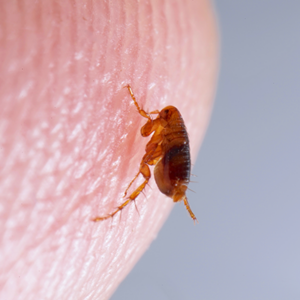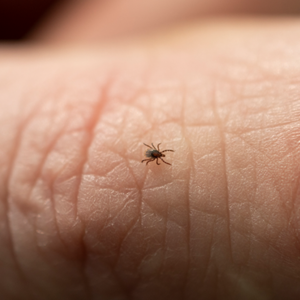September is typically when flea and tick season in Michigan comes to a close. Unfortunately, the weather in the last few years has been quite unpredictable. Warmer temperatures often last far longer into fall. And it’s only going to get worse with climate change. As long as the weather is above freezing, there’s a chance that fleas and ticks could still be lurking in your lawn, flower beds, or other areas of your property. These tiny critters can carry diseases that seriously damage our health and could even become lifelong chronic conditions. That’s why it’s so important to get flea and tick control for your yard.
5 Flea and Tick-borne Diseases
Flea-borne (murine) Typhus
Fleas can infect people and animals with their bites and through contact with their fecal matter. Flea-borne typhus is actually spread in such a manner. When fleas’ feces get in any open wound created by their bite, the disease will take over. You can also contract it by breathing in flea feces or rubbing it into your eyes. This isn’t hard to do. If your pet has fleas, and you are unaware, you could come in contact with the fecal matter simply by petting your dog and then later rubbing your eye. If your dog rolls on the carpet, it could deposit flea dirt there. And when you vacuum, that flea dirt will get kicked up and become airborne. Flea-borne typhus has an incubation period of about two weeks after initial contact. Symptoms may include:
- Fever and chills
- Body aches and muscle pain
- Loss of appetite
- Nausea
- Vomiting
- Stomach pain
- Cough
- Rash (typically occurs around day 5 of illness)
If untreated, flea-borne typhus can damage organs, including the liver, kidneys, heart, lungs, and brain.
Tapeworm
Tapeworm is especially troubling if you have pets or small children. Animals and people become infected when they swallow a flea infected with tapeworm larvae. Like flea-borne typhus, this typically happens inadvertently. For instance: an infected flea bites your pet; your pet, in turn, bites the area to relieve themselves of the itch, and voila – they swallow a flea. Once inside your pet, the larval tapeworm will develop into an adult tapeworm. Adult worms form bodies that have segments, called proglottids, which break off into the digestive tract so they can exit your pet or child when they use the bathroom. The worms do this so that their eggs can leave the infected host and eventually find a new one. Children are most susceptible to this because, as any parent knows, children are always putting things in their mouths. You can check your pet or child for tapeworms by looking at their stool. If you see something that looks like white rice, have a medical professional check them for tapeworms. Unfortunately, fleas can easily get into the house by hitching a ride on your pet. Once indoors, they will quickly overtake your home, which is why being proactive about pest control is so crucial.
Heartland Virus
Currently, only Lone Star ticks are known to be hosts of this virus. Scientists aren’t certain at this time if other tick species can spread it as well. Those infected experience fever, fatigue, decreased appetite, headache, nausea, diarrhea, and muscle or joint pain. Many people are hospitalized due to this virus because it affects the white blood cell count, which opens your body up to other bacterial or viral threats. Heartland virus also lowers the platelet count, which means if an infected person has a cut, their blood may not clot as well, and they could end up losing more blood than normal. Like many tick-borne illnesses, it could take up to two weeks for the symptoms to appear.
Tularemia
Tularemia is a disease that can infect humans as well as our pets. If you have a rabbit, rat, mouse, or guinea pig, you should know their risk with this disease is higher. You can contract this disease through skin contact with an infected animal that’s been bitten by a tick. You can also pick it up if it becomes airborne in the dust. All victims have a fever, and if you contracted the disease through a tick bite, you’d develop a skin ulcer where the bacteria entered the body. Lymph nodes swell, usually in the armpit or groin, and if left untreated, the bacteria can travel through the bloodstream to the lungs.
Lyme Disease
This is probably the most dangerous and notorious tick-borne disease. It’s the most common vector-borne disease in the United States. Only the black-legged tick can carry this disease. If left untreated, the infection can spread to joints, the heart, and the nervous system and result in lifelong health problems. If caught early, you can often rid yourself of the bacteria through powerful antibiotics. Most cases of Lyme disease can be treated successfully with a few weeks of antibiotics. The symptoms have a wide range and will only get worse if left untreated. Symptoms include:
- Fever
- Chills
- Headache
- Fatigue
- Muscle and joint aches
- Swollen lymph nodes
- A bullseye red ring around the bite
- Bad headaches
- Neck stiffness
- Droopy facial muscles
- Arthritis
- Severe joint pain
- Irregular heartbeat
- Dizziness
- Shortness of breath
- Inflammation of brain or spinal cord
Why Call A Pest Control Company
The only guaranteed way to protect yourself, your pets, and your family from these horrible diseases is through our perimeter pest control spray. We’ll spray the exterior of your home as well as eavestroughs and gutters to make sure any breeding grounds are wiped out before they have a chance to hatch. This protective barrier will last for many weeks before reapplying, and it even works after rainfall.
Stop Fleas And Ticks With Perimeter Pest Control
The experts at Alpine Tree and Lawn Care provide lawn care services and perimeter pest control services for Macomb county. We’ll use specialized equipment and products to create a barrier around the exterior of your home. It will wipe out any active fleas and ticks and prevent various other bugs from coming inside. The only surefire way to prevent a flea or tick bite is to kill them before they have a chance to breed and spread. Don’t rely on bug spray alone. Contact us online here or give us a call at (586) 884-7799 to learn more or schedule an appointment. Be sure to check out our blog page for more helpful articles and like us on Facebook to see photos of our work and learn about the latest deals!